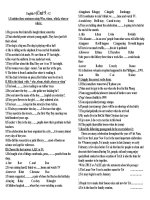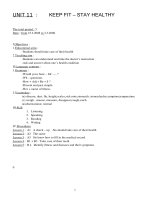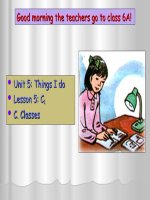unit 8
Bạn đang xem bản rút gọn của tài liệu. Xem và tải ngay bản đầy đủ của tài liệu tại đây (2.57 MB, 41 trang )
<span class='text_page_counter'>(1)</span>
<span class='text_page_counter'>(2)</span>
<span class='text_page_counter'>(3)</span>
<span class='text_page_counter'>(4)</span> 1 2 3 4 5 6 7 8 9.
<span class='text_page_counter'>(5)</span> 2 3 4 5 6 7 8 9 1.
<span class='text_page_counter'>(6)</span> birthday.
<span class='text_page_counter'>(7)</span> Christmas.
<span class='text_page_counter'>(8)</span> Tet.
<span class='text_page_counter'>(9)</span> Easter.
<span class='text_page_counter'>(10)</span> Mid-fall festival.
<span class='text_page_counter'>(11)</span> Wedding.
<span class='text_page_counter'>(12)</span> Period 49 Lesson 1. Getting started Listen and read Listen.
<span class='text_page_counter'>(13)</span> I. Vocabulary.
<span class='text_page_counter'>(14)</span> sticky rice cake (n): bánh chưng.
<span class='text_page_counter'>(15)</span> slavery (n): sự nô lệ.
<span class='text_page_counter'>(16)</span> parade (n): cuộc diễu hành.
<span class='text_page_counter'>(17)</span> Jewish (adj): thuộc về Do Thái.
<span class='text_page_counter'>(18)</span> 1. slavery (n) # freedom(n) 2. sticky rice cake (n): 3. parade (v, n): 4. Jewish (adj): 5. freedom (n): 6. Passover (n): 7. parade ( n): 8. occur = happen (v) 9. celebrate(v) 10. celebration (n).
<span class='text_page_counter'>(19)</span> + A. slavery. B. sticky rice cake. = C. parade. D. Jewish.
<span class='text_page_counter'>(20)</span> II. Grammar: * Relative clause: 1. Tet is a festival. Tet occurs in late January or early February. Tet is a festival which occurs in late January or early February. 2. Family members try to be together at Tet. They live apart.. Family members who live apart try to be together at Tet..
<span class='text_page_counter'>(21)</span> II. Grammar: * Relative clause: 1. Tet is a festival. Tet occurs in late January or early February. Tet is a festival which occurs in late January or early February. 2. Family members live apart . They try to be together at Tet.. Family members who live apart try to be together at Tet..
<span class='text_page_counter'>(22)</span> I. Vocabulary II. Open- predict.
<span class='text_page_counter'>(23)</span>
<span class='text_page_counter'>(24)</span>
<span class='text_page_counter'>(25)</span>
<span class='text_page_counter'>(26)</span> I. Vocabulary II. Open- predict III. Language notes.
<span class='text_page_counter'>(27)</span> I. Vocabulary II. Open- predict III. Language notes IV. Table completion.
<span class='text_page_counter'>(28)</span> Read the text and complete the table Celebration Tet. When? late January or early February. late March or early Passover April. Easter. late March or early April. Activities. Food. cleaning & sticky rice decorating homes, cake enjoying special food eating a special meal. watching colorful parades. Country Viet Nam. special Israel meal called Seder chocolate, in many countries sugar eggs.
<span class='text_page_counter'>(29)</span> I. Vocabulary II. Open - predict III. Language notes IV. Table completion V. Answer some questions.
<span class='text_page_counter'>(30)</span> Choose a picture and answer the question.
<span class='text_page_counter'>(31)</span> What do Vietnamese people think about Tet? Tet is the most important celebration for Vietnamese people..
<span class='text_page_counter'>(32)</span> When do Jewish eat the special meal called the Seder? On the first or second nights of Passover.
<span class='text_page_counter'>(33)</span> What do people do on Easter festival? Young children receive chocolate or sugar eggs. People crowd the streets to watch colorful parades..
<span class='text_page_counter'>(34)</span>
<span class='text_page_counter'>(35)</span> I. Vocabulary II. Open-predict III. Language notes IV. Table completion V. Answer some questions VI. Listening.
<span class='text_page_counter'>(36)</span>
<span class='text_page_counter'>(37)</span> Listen to the song Auld Lang Syne and fill in the missing words Auld Lang Syne Should auld acquaintance be forgot and never brought to mind? Should auld acquaintance be forgot and (a)……………………… of auld lang syne For auld lang syne ,my dear, For auld lang syne We’ll (b)………………….. A cup of kindness yet, For auld lang syne Should auld acquaintance be forgot and never brought to ©………………..? Should auld acquaintance be forgot and days of auld lang syne For auld lang syne ,my friend, For auld lang syne We’ll take a cup of (d)……………………. yet, For auld lang syne.
<span class='text_page_counter'>(38)</span> Listen to the song Auld Lang Syne and fill in the missing words Auld Lang Syne Should auld acquaintance be forgot and never brought to mind? Should auld acquaintance be forgot and (a)……………………… of auld lang syne. days For auld lang syne ,my dear, For auld lang syne We’ll (b)………………….. A cup of kindness yet,. take. For auld lang syne Should auld acquaintance be forgot and never brought to ©………………..? Should auld acquaintance mind be forgot and days of auld lang syne For auld lang syne ,my friend, For auld lang syne We’ll take a cup of (d)……………………. yet, kindness For auld lang syne.
<span class='text_page_counter'>(39)</span> I. Vocabulary II. Open- predict III. Language notes IV. Table completion V. Answer questions VI. Listening VII. Homework.
<span class='text_page_counter'>(40)</span> - Learn vocabulary - Write the introduction about one celebration that you like best (about 50 words).
<span class='text_page_counter'>(41)</span>
<span class='text_page_counter'>(42)</span>









